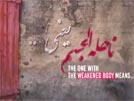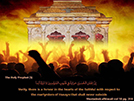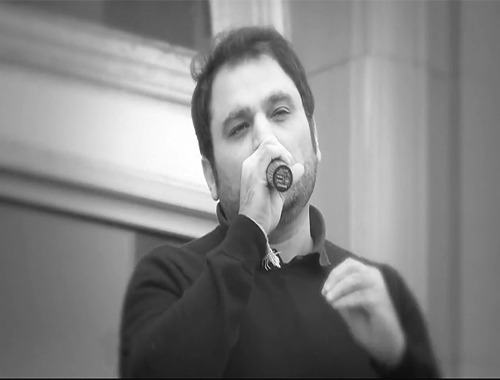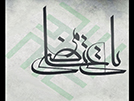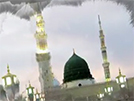HALTING PLACE II: MATAAF
- Details
- Hits: 2695
HALTING PLACE II: MATAAF
وَلْيَطَّوَّÙÙوا بÙالْبَيْت٠الْعَتÙيقÙ
?? And let them go round the Ancient House. (The Holy Quran; 22:29)?
We now enter the city of Mecca where the Messenger of God was born and the Holy Quran was revealed. It is the descending place of the revelation and the angels. It is a city of security. Its safety has covered both plants and animals. No one has the right to cut off a plant, to harm an animal even to scare away the birds form their nests. For this reason, the birds of the Sacred Mosque are accustomed to bet people and fly here and there without being scared. This, by itself, shows the spread of overall justice in the world of Islam to the extent that even plants and animals are secure from aggression let alone the human beings who have superior rights.
Mecca, the Mother of cities, is the birthplace of the real civilizations of human beings, a civilization devoid of corruption, indecency, and plundering, a civilization that generates godly, trustworthy, truthful, faithful, and pious human beings. Such a civilization produced the Holy Quran that has its rise from the horizon of Mecca. Therefore, Mecca is the mother of the cities where actual humanity lived. Mecca is the generator of a magnificent human civilization devoid of bestiality. Mecca is the city of monotheism, a sacred center, which houses the Ancient House, the ancient temple as well as the international Muslims' Kiblah.
We now go through the streets of Mecca, though overcrowded but dignified and tranquillizing, and approach the Sacred Mosque. We see the flood of pilgrims pour into the magnificent Mosque and enthusiastically go towards the Kaaba through different gates opened to the guests of God. We, too, enter the Mosque and our eager look falls on the Kaaba, and edifice of glory and majesty having its head in heaven, casting its shade upon God's servants and spreading its lap to give comfort to God's guests who have come here from distant places with much trouble.
Like moths attracted to bright lights, the pilgrims, fascinated by the Kaaba, go round and embrace it as the dearest one, expressing their need to the One Who is free from want. They are deeply impressed by the scene. They start weeping and praising the House of God:
--------------------------------------------------------------------------------
( 90 )
الØَمد٠لله٠الّذي عَظَّمكَ وشَرَّÙÙŽÙƒÙŽ وكَرَّمَكَ وجَعلكَ مَثابَةً للنّاس٠وأَمْناً، Ù…Ùبارَكاً وهÙدىً للعالمينَ.
?Praise is due to Allah Who gave you dignity and honor making you pilgrimage for men and place of security, blessed and guidance for the people of the world.?1
Yes, this is the House of the Lord of the heavens and the earth. It is a house whose magnificence makes the kings' hearts sink and whose majesty and awe made the prophets prostrate themselves before it saying: سائÙÙ„ÙÙƒÙ ÙَقيرÙÙƒÙŽ Ù…ÙسكينÙÙƒÙŽ بÙبابÙÙƒÙŽ Ùَتَصَدّقْ عليه٠بالجَنّةÙ
?O Lord, Your humble, poor, and needy servant has come to Your House. Do him favor by giving a portion of Paradise to him.?2 اللّهÙمّ البيت٠بيتÙك٠والØَرَم٠ØَرَمÙÙƒÙŽ والعَبد٠عَبدÙÙƒÙŽ
?O Lord, the House is Yours, the Sanctuary is Yours, the servant too is Yours.?3
IMAM BAQIR BY THE SIDE OF THE KAABA
Aflah, the slave whom was set free by Imam Baqir (a.s) reports: I was accompanying Imam Bqir (a.s) during Hajj. When he entered the Sacred Mosque and his look fell on the Kaaba, he was overwhelmed by weeping. I said, 'My parents be ransoms for you, people are watching you, can you not lower your voice to a whisper?' The Imam answered, 'O Aflah, this is Allah's House, why should I not be weeping? Perhaps He will look at me favorably making me delivered in the Hereafter.'
The Imam then circumambulated the Kaaba, performed the Tawaf Prayer in its proper place, and went into prostration. When he raised his head, I saw that his forehead was wet with tears.4
____________
1 See al-Mahajjat ul-Beidhaa; vol. 5 p.169
2 See al-Mahajjat ul-Beidhaa; vol. 5 p.170
3 See al-Mahajjatol Beizaa; vol. 5
4 See al-Mahajjat ul-Beidhaa; vol. 4 p.243
--------------------------------------------------------------------------------
( 91 )


